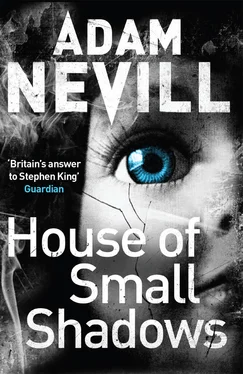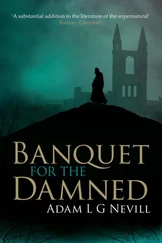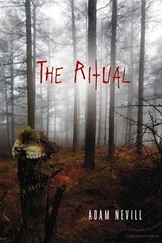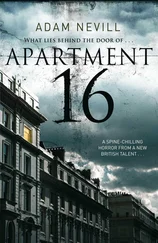‘Cath! Cath! Cath!’ she could hear Mike’s voice behind her.
Catherine pinched her nose to stop whatever was running out of it, and even more strongly now, and carried on to the church. As she moved she located the wet wipes in her bag and tore one free to wipe at her face.
Once she was level with the gaping red doorway of the shabby scout hall, a needle was scraped out of a groove inside the church. The awful metallic rendition of ‘Greensleeves’ stopped abruptly.
In the sudden silence, behind her and further down the street, a door slammed shut.
She turned her head to see if her craven ex-boyfriend had followed her up the street.
The blood-light from the church and scout hall dwindled into shadows as it bled down the narrow lane. But Mike was no longer standing where she’d left him only moments before. In fact, there was no one behind her, or even present in the lane.
But all considerations of her ex-boyfriend were erased at the sight of the vessel, as well as its murky occupant, that lumbered through the light of the church vestry. An object preceded by a bustling crowd in vintage costume.
The casket was lowered to skim beneath the arch, but then rose, shaking, as if those who transported it had suddenly stood up straight.
Catherine took the long box for an antique coffin, made out of long glass panes held together by iron brackets. Some kind of sarcophagus as Mike had suggested.
What she could see of the occupant of the rectangular casket looked like a mannequin. A small female dummy dressed in a lavish black gown and sat upon a high-backed chair; tiny and immobile, save for the wobbles as it was clumsily manoeuvred down the church path. Nothing of the face, beside a small whitish oval, could be seen behind its black veil.
She began to fear she might be in the presence of an embalmed body of local significance. Thoughts of Edith’s mother came to her again and were as unwelcome as before. Had Violet Mason been preserved as a saint and locked inside the wretched church? But if she’d died after her brother, then who had preserved Violet?
But then, it couldn’t be Violet; the body was too small.
Since her first visit to the Red House she wondered if anything seen thus far had filled her with as much revulsion as the strange glass canister and its shrunken occupant. She tried desperately to convince herself that the effigy had been constructed from papier-mâché and dressed in funereal black clothing. Unless a child had been employed to represent a female character pertinent to the tradition of the village.
A float draped in black silk followed from the church to join with and to bear the horrible cargo.
The crowd chattered excitedly in voices too low to hear. They merged into one messy column in the shadows before the front of the scout hall.
Catherine looked back down the lane. Mike had gone. But this is what he had seen. Something that really upset him. She understood why.
Catherine took two steps away from the scout hall. But while she’d been staring with a horrified fascination at the relic, the crowd and their effigy had produced a ring around the front of the hall and church, blocking the entire width of the lane. They moved the wobbling sarcophagus right at her.
Again, with what felt like a horrible inevitability, she was trapped. She retreated up the little path and ducked inside the hall. There was nowhere else to go. And nothing could have tempted her to stand her ground and be made to peer inside the upright glass cabinet. If she hadn’t moved so swiftly she would have been forced to see the occupant of the sarcophagus in much greater detail. She would have been face to face with it.
Inside the hall she came upon multiple rows of collapsible wooden chairs older than the narrow building that encased the furniture. The only light was frail and filtered through the dirty glass of three small stage lights, fixed above the curtained podium at the far end of the hall.
Catherine moved along the back row of seats and sat in a tiny uncomfortable chair at a distance from the aisle, and as far away as she could get from a small wooden stage draped in velvet curtains.
She bit her bottom lip, and dabbed a wet wipe at the fresh blood gathering under her nose. She must look a fright. Barefoot in the white dress with blood running over her mouth. Somehow her ghastly appearance seemed fitting.
Tara must still be close. She must have been inside the church to watch whatever pageant service had recently been conducted. Tara hadn’t come out of the church but may have been at the end of the procession. Maybe she was with Edith. If Tara entered the scout hall with the crowd, Catherine would have to get the car keys off her, find the car and leave. But how would she get the keys?
When she realized her hands were shaking, she clasped them together in her lap. Maybe it was the thought of seeing her again that contributed to her palsy, or perhaps she had entirely, finally, lost her wits.
All she had seen this night might appear eccentric but unthreatening to a mind less disturbed than her own. It was possible that her sanity had unravelled and she was now stuck in a continuous loop of grotesque fantasy erupting from her subconscious mind. In fact, within near total darkness in unfamiliar surroundings, she must remember that anything could seem to be just that: possible.
She prayed she was delusional, ill, drugged, anything but fully lucid. Because if she were mad, at least what she was experiencing was imagined and not real.
And into the hall they came. They hobbled and they scuttled. They shuffled and they crept. But moved in haste to find seats.
Some of the little figures crowded the floor before the stage like children before a Punch and Judy show, until the hall was filled with the groans and squeaks of small bodies shifting upon the wooden chairs. And they all looked forward, at the stage.
Catherine suspected they were aware of her, but deliberately ignoring her.
The members of the audience were so shrunken in their capes she doubted a single one was younger than ninety. But how had some of them moved so swiftly outside?
In the vague burgundy light she also stared at enough vintage millinery and evening dress to fill a small museum. Watteau hats and great headdresses drooped with leaves and half-roses, forming misshapen rows of black humps up to the stage.
The closest veils in her row were black, some spotted, some patterned, and all covered hints of bleached faces. Gauzy and spangled fans quickly spread. All of the men needed a haircut. She felt like she was stuck in some vast and surreal Memento Mori photograph.
Hair and nails continue to grow after death.
She stopped the train of thought, because it led to assumptions that would be unbearable while trapped in the dark among these ‘people’.
There was still no sign of Tara, or Edith or Maude for that matter.
From the seats before her, the fragrance of musty fabric began to drift and settle about her, as if the garments had only been recently released from confinement in damp, airless spaces. In unheated rooms in old houses. She knew the odour from the house clearances she had attended. Old bottled scents similar to Edith’s perfumery had been lavishly applied to cover the smells of age, and to conceal something else: a trace of the chemical pungency of the Red House. It made her sick in Mason’s workshop and began to turn her stomach again now.
She rummaged in her bag for more scented wet wipes so she could hold a handful against her nose and mouth. It was too late to stand up and make her way out. She would draw attention to herself as she climbed over the little laps in the dark.
She would be forced to sit in the stench. The hall was airless, the windows blacked out; if the door closed she might faint.
Читать дальше












